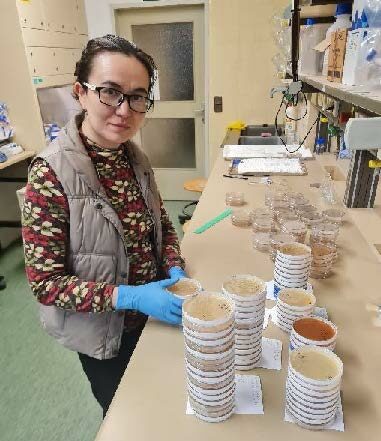Meet FEMS Industry Placement grantee Galiya Akhmetova
07-02-23
Industry Placement Grants assist early career scientists to gain experience at a European host industry.
 Galiya Akhmetova: Eötvös Loránd University, Hungary
Galiya Akhmetova: Eötvös Loránd University, Hungary
Host industry: Saniplant Biotechnological Research and Development Ltd, Hungary
Dates: October 2022 – January 2023
FEMS Member Society Membership: Hungarian Society for Microbiology
Can you tell us a little bit about yourself?
I am currently doing my PhD at Eötvös Loránd University in Hungary but I am originally from Kazakhstan. Previously, I worked at A.I. Barayev Research and Production Centre for Grain Farming focusing on Pseudomonas bacteria and at the same time I was doing my Master’s in Biotechnology at Eurasian National University L.N. Gumilyov, Kazakhstan. As a compulsory internship during my studies, I visited Leuven and Anthwerpen Universities in Belgium. I found it very useful and learned modern techniques at these universities, so I decided to complete my PhD outside of the country. After I applied for some programs, I won a Stipendium Hungaricum Scholarship to do my PhD at Eötvös Loránd University. I wanted to broaden my knowledge in microbiology, so I decided to focus on fungal endophytes, and improve my knowledge in mycology. My main focus is endophytic fungi, mainly the Ascomycota group: Fusarium, Murispora, and Laburnicola genera. I am interested in describing novel species isolated from agricultural and non-agricultural plants of Northern Kazakhstan. I have written several publications on Fusarium and Murispora genera.
How was your experience in industry?
I completed an industrial placement at Saniplant Biotechnological Research and Development Ltd which is located in Gődőllo city in Hungary. Since 2006, the main activity of the company is research and product development in the field of agricultural biotechnology, microbiology, and environmental protection. They develop biotechnologically produced, cost-effective, and environment-friendly soil-amelioration and plant protection solutions that promote sustainable agricultural production due to reducing the need for artificial fertilizers and pesticides.
I planned to learn the steps of developing microbial inoculants by connecting theory and practice. I planned to screen the pesticides, insecticides, and fungicides to test the tolerance of the bacterial strains. In addition, I was interested in checking the active ingredients of each pesticide and their effect on bacterial growth. Last but not least, I targeted to check all bacterial strains as they are environmentally friendly. Finally, I planned thoroughly to investigate the tolerance of the bacterial strains to each of the pesticides to be able to draw a conclusion. Therefore, I planned to achieve an understanding of how microbial inoculants can depend on the active ingredients of the pesticides and how it is important to know how to apply them in the field. During my three months at SaniPlant, I gained knowledge of routines to accomplish these tasks and improved my understanding of laboratory and natural field conditions.
This grant gave me huge experience in a biotech company to learn, understand and use microbial inoculants effectively to be able to save the environment, and produce ecologically clean agricultural products. In addition, it allowed me to broaden my knowledge in this topic which is so helpful and useful for my future career to think ahead of working and developing one day effective strains and creating a bio-product. Moreover, this opportunity contributed to my understanding of the large-scale biotechnological industry and how bioproducts can generally work leading to green technology.
FEMS is highly reputable among scientists around the world, and it is such a great achievement to get this grant from them, and feel part of the FEMS network. In general, FEMS provides great opportunities for researchers to learn better in the best conditions to meet their goals. After receiving this grant, I became highly motivated to continue my research further.
In academia, we are learning theory and partly laboratory work. However, there are many different subjects to focus on, and complete practical classes in each course. It gives a general understanding and knowledge of each subject. However, advanced learning can be achieved with more time and experience. My industry placement gave me an opportunity to connect all three steps: learn theory, and laboratory work, and connect this knowledge to the natural open field area. This is a great achievement to think ahead of how practical results will work in the field area in connection to the theoretical knowledge applying all details to it. This grant opportunity gave me a precise focus on the topic and was able to link all study areas on how microbial inoculants could be effective to defend plants from pathogens.
–
We use income from the FEMS Journals to fund grants, awards, and projects, and to support our knowledge sharing events and initiatives. Consider publishing your research with our journals to help the global microbiology community.

